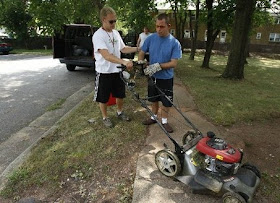 From The Star-Ledger in NJ. The article is part of a 4-part series called "A Place of Their Own" about Garden Academy, a private, special-education school in Essex County for severely autistic students. In the picture, Men with Mops Program Coordinator James Maraventano, left, helps Matt Fahrenkoph prep the lawn mower before mowing the grass at a home.
From The Star-Ledger in NJ. The article is part of a 4-part series called "A Place of Their Own" about Garden Academy, a private, special-education school in Essex County for severely autistic students. In the picture, Men with Mops Program Coordinator James Maraventano, left, helps Matt Fahrenkoph prep the lawn mower before mowing the grass at a home.For an autistic worker, the hardest part of a job is often the easiest for everyone else: Joking with co-workers, sharing desserts on a special day, instinctively treating your boss with respect.
Being socially correct is grueling. And for some autistic adults, an impossible task.
Autism advocates are saying this is an issue more companies in New Jersey will have to start dealing with, as there will soon be a surge in autistic adults in the workforce.
A state-commissioned report due out this month is starting to tackle the problem. It's an issue that faces more challenges as unemployment reaches historic heights and as public interest and dollars still remains fixed on autistic children.
"A lot of public awareness has been around children with severe challenges," said Leslie Long, public policy director for Autism New Jersey. "You have to now look at John who's now 20. Putting him on a brochure for funding isn't going to work anymore. He has a right to work and wants to work. How do you help him?"
New Jersey's progressive special-education laws allow autistic children to receive a comprehensive education until they reach age 21. But after that, funding drops and many autistic adults today sit at home with little to do, Long said.
Graduating autistic students often don't find jobs on their own, said Jane Wilkie, adult services director of the Midland School, a special-education school in Somerset County.
"If we weren't able to put them in jobs they were going home not to do anything," Wilkie said.
One in 94 children in New Jersey is diagnosed with autism, compared with one in 150 children in the nation, according to the federal Centers for Disease Control and Prevention. There are no reliable statistics for the number of autistic adults in New Jersey because many have been misdiagnosed, Long said. The state recently launched an online registry for autistic adults, but the numbers so far are sketchy. Unemployment nationwide for disabled adults in general hovers at about 70 percent, Long said.
The hallmark characteristic of autism is poor social communication, and individuals can range widely in abilities and functioning including people who cannot speak but also people with Asperger's Syndrome who have college degrees and often higher-than-average IQ's, said Sandra Harris, founder and director of Rutgers University's Douglass Developmental Disabilities Center for the Disabled.
"The overwhelming majority of people on the autism spectrum can do some kind of work," she said.
Aside from communication barriers, challenges that can cripple autistic workers include sensory sensitivity, to fluorescent lights, for example, and getting clear directions on what needs to be done, said Ari Ne'eman, a 21-year-old with autism who grew up in East Brunswick, and founded The Autistic Self Advocacy Network.
Social pleasantry should be eliminated as criteria for hiring and a good job evaluation, Ne'eman said.
Depending on whether the person is low- or high-functioning, an autistic adult can excel at tasks involving categorization, such as box-sorting in a warehouse, or software engineering, he said.
For example, Wilkie told the story of an autistic person working at a dry cleaning company. The worker didn't use tickets with numbers on clothing because he'd memorized the numbers, said Wilkie said.
But an autistic worker's poor social skills can get them fired, said Nancy Perry, the Berkeley, Calif.-based author of "Adults on the Autism Spectrum Leave the Nest: Achieving Supported Independence," published last year.
In the case of people with Asperger's syndrome, individuals often with above-average IQ's, the main reason they lose jobs is for offending their boss, Perry said.
"The favorite word of an Asperger's is 'Actually ...'" she said. "They're always correcting people."
In 2007, the state Legislature commissioned the New Jersey Adults with Autism Task Force within the Department of Human Services to study better ways to care for autistic adults' needs for housing, jobs and long-term care. Recommendations for the employment section of the report include creating public-awareness ads to educate the public and employers about autism; compiling a roster of companies willing to hire autistic adults; and requiring schools to give job training to autistic children and young adults, said Long, a member of the task force.
But, "right now the economy is the biggest problem. All people are struggling to find work, and we face that, too," said Roni Kantor, a state Department of Human Service's employee who helps coordinate employment services for disabled people.
Three years ago, the parent of an autistic man brainstormed with Rutgers' Douglass Developmental Disabilities Center for the Disabled to create Men with Mops, a company that hires part-time autistic workers exclusively. The company now has about 80 customers and is manned by 23 autistic men with mostly severe disabilities and pays them minimum wage to mop floors and mow lawns. Each worker is accompanied by a job coach at all times, said company co-director Christopher Manente.
But Long, the policy director, said the Men with Mops model has been around for people of other disabilities since the 1980s. Replicating its business plan isn't the answer. New Jersey needs to think bigger, to make room for autistic people in mainstream jobs in growing industries, she said.
"Who's installing the solar panels?" Long asked.